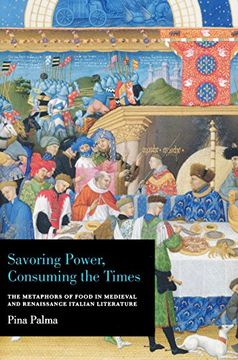Savoring Power, Consuming the Times: The Metaphors of Food in Medieval and Renaissance Italian Literature
Synopsis "Savoring Power, Consuming the Times: The Metaphors of Food in Medieval and Renaissance Italian Literature"
Pina Palma’s Savoring Power, Consuming the Times: The Metaphors of Food in Medieval and Renaissance Italian Literature is an innovative look at the writings of five important Italian authors―Boccaccio’s Decameron, Pulci’s Morgante, Boiardo’s Innamorato, Ariosto’s Furioso, and Aretino’s Ragionamento. Through the prism of gastronomy, Palma examines these key works in the Western literary canon, bringing into focus how their authors use food and gastronomy as a means to critique the social, political, theological, philosophical, and cultural beliefs that constitute the fabric of the society in which they live. Palma begins with the anthropological principle that food represents the universal transformation of nature into culture and that it functions as a language that distinguishes every society and its culture from others. This suggests that food―its preparation, presentation, and consumption―is more than merely a source of nourishment. Rather, Palma argues, foodstuffs function as ethical and aesthetic instruments through which the literary hero’s virtues and flaws, achievements and failures, can be gauged. Food also serves as a means to maintain, as well as to negotiate, power, social hierarchy, and relationships between the powerful and the powerless. Touching on three centuries that were pivotal for Italian culture, literature, and history, as well as three literary genres, Palma’s analysis connects the descriptions and references to food found in these works with the wider culture of Italy in the late medieval and early modern period. "With clarity and wit, Pina Palma has used the central metaphor of food to uncover unexpectedly fresh dimensions of Renaissance intellectual traditions. Her fascinating and original exploration of the connections between food and sexuality, political power, moral hypocrisy, ascetic discipline of the body, and the world of the appetites in a selection of key Italian Renaissance works is sure to engage historians as well as literary scholars." ―Giuseppe Mazzotta, Yale University "This excellent volume examines some of the major works of Italian medieval and Renaissance literature from the perspective of their references to food and its consumption. It makes a very significant contribution to Italian studies (in its various categories) and can even be of interest to non-Italianists for the insights and information it provides for other geographical areas and literatures in late-medieval/early-modern Europe." ―Konrad Eisenbichler, University of Toronto "Savoring Power, Consuming the Times is not simply a book about food in Italian literature. It is a subtle and far-reaching work of criticism, which discloses an original aspect of the Renaissance. Not only does food provide a way of accessing a privileged perspective on the Renaissance religious, philosophical, and moral thinking; but it is also the perfect means of building an unexpected web of relationships between authors." ―Salvatore Silvano Nigro, Libera Universita di Lingue e Comunicazione, IULM

